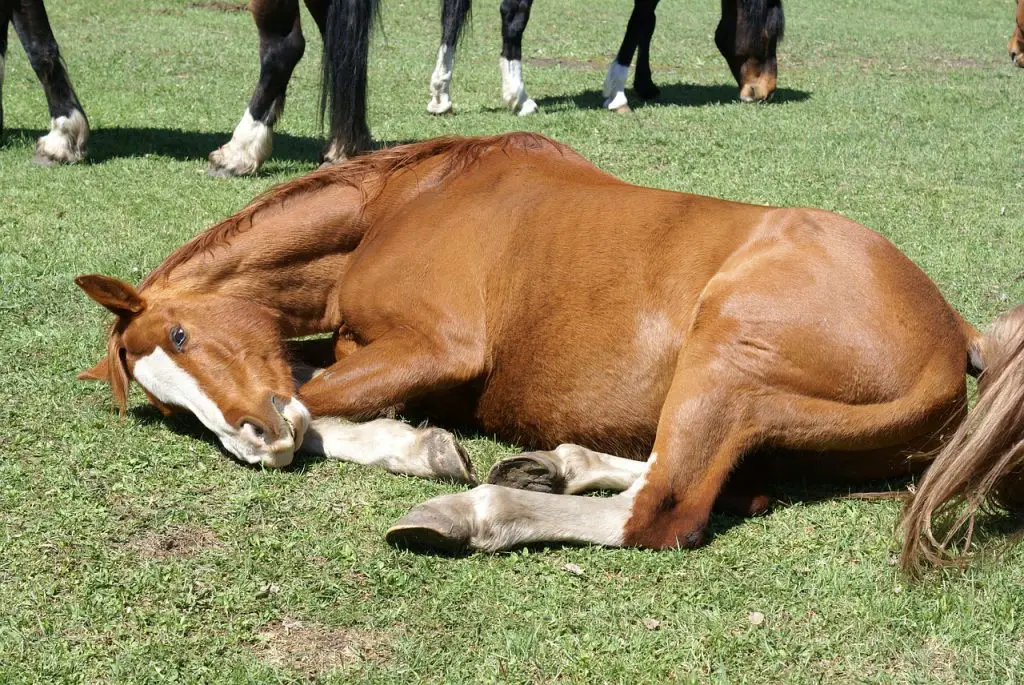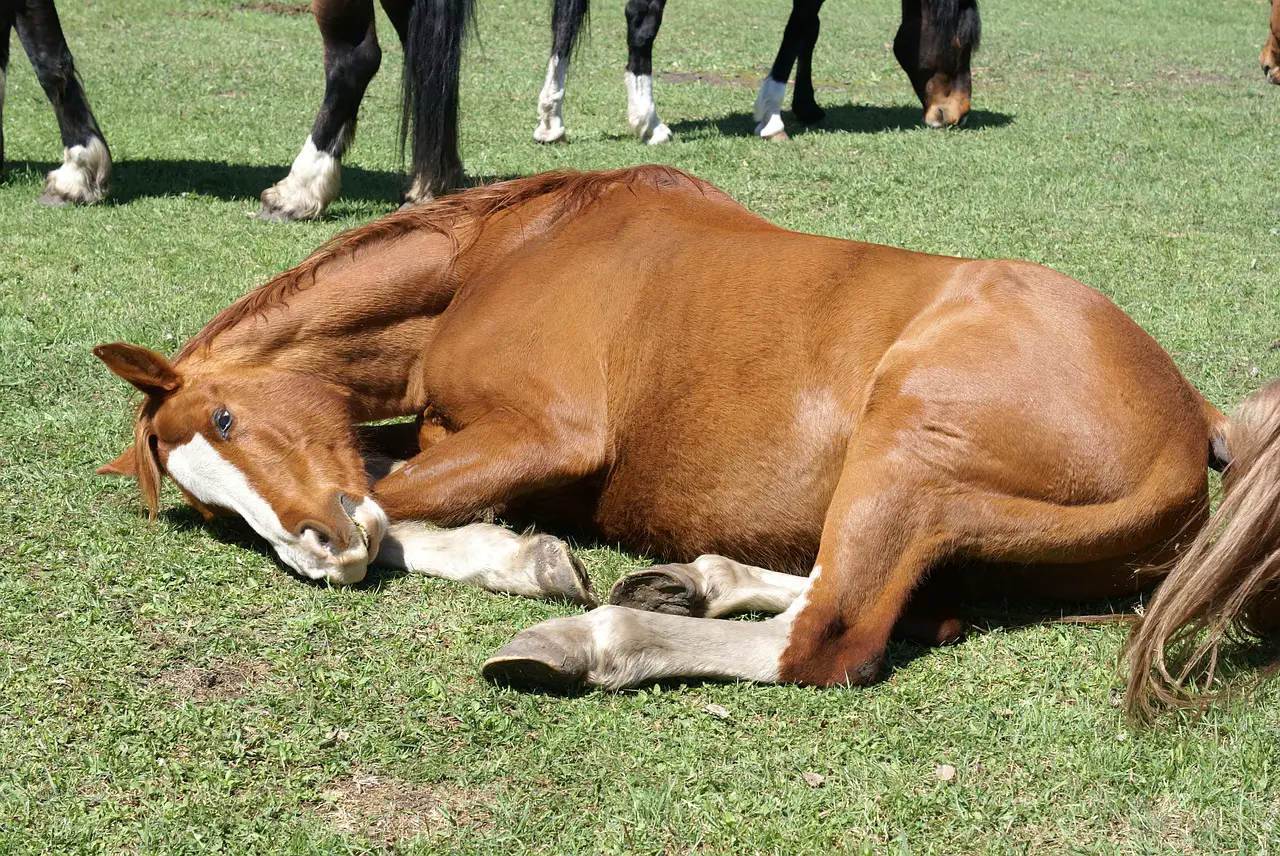Last Updated on March 8, 2022 by Allison Price
Imagine this: Your young nephew runs into the aisleway while you work in the barn during summer. You send him back to the barn, but not before he trips on something sharp. He doesn’t seem to have any injuries and you can’t see any cuts or punctures in his foot so you and he both forget it.
His foot is still throbbing and inflamed two days later. It is so painful that he can’t even walk on it and must be carried to the car to get to the doctor. At first, the doctor thinks he stepped on some rusty nails. But closer inspection shows that there is a small splinter from his barn adventure. The doctor removes the splinter and cleans and stitches the wound. She then sends her patient home, with a clear warning that he should not be barefoot in the barn.
Although wearing shoes to the barn is not a problem, the story of the barefoot nephew is a metaphor for a far more serious equine problem, colitis.

Colitis is a term that refers to inflammation of the mucosa (lining) of the large intestinal tract. Colic and diarrhea are common symptoms of this inflammation in horses. However, it is important to remember that the term “colitis” only refers to a few symptoms. These symptoms can be caused by many agents, both infective and non-infectious. It is important to determine the source of colitis before you can formulate a treatment plan.
The colitis is found in the foot, while the splinter is under-lying diseases. The doctor had to determine the cause, which was a splinter and not a rusty nails, in order to begin treatment. However, the treatment for both diseases is the same: Take care of the wound and avoid the barn if you are barefoot.
Horses with colitis: How to define it
Colitis is most common among horses aged between 2-10 years. It can affect any part of your large intestine including the colon, cecum or large colon. It can either be a chronic condition (chronic) or a temporary affliction (“acute”) and can be caused or many things.
Possible causes of colitis in horses can be identified as follows:
Infectious:
- Bacteria: Salmonella, Clostridium difficile, Clostridium perfringens, Lawsonia intracellularis, Neorickettsia risticii (Potomac Horse Fever)
- Viruses: coronavirus, rotavirus for foals
- Parasite: tiny strongyles
Noninfectious:
- Antibiotic-associated diarrhea
- Large bowel irritation due to sand
- Unbalanced diet
- Neoplasia (cancer).
- Inflammatory bowel disease
- Toxicities in plants and drugs
- NSAID toxicosis Right Dorsal Colitis
Colitis can also be caused by other causes:
It is sometimes difficult to determine the cause of colitis. We do know that colitis can be caused by lifestyle factors. These can be stress episodes related to competition, travel, management conditions or antibiotic or antihelmintic treatment (dewormers).
Colitis and Horse Health
The effects of mucosal inflammation, whether you have colitis that is acute or chronic, can cause severe symptoms and even death. Colitis can have the following common side effects:
- Sloughing or shedding of the mucosa or submucosa in the large intestine and/or necrosis (tissue loss).
- Capillary dilation and an increase in the permeability of blood vessels (vascular endothelium) are two consequences. The increased permeability of the intravascular compartment allows fluids and protein to move into the intestinal area, which can lead to diarrhea and dehydration.
- A decreased absorption of nutrients, electrolytes and water can lead to a reduction in nutrition.
- Mucosa more susceptible to infection by pathogens or toxins
- Mucosal swelling (or fluid retention), focal hemorhage, and tissue death are all possible.
Horses with colitis: Clinical signs
Colitis is not something to be taken lightly. Colitis is best diagnosed early as it can cause rapid debilitation or even death. The horse’s overall health and the cause of the condition will determine the severity and symptoms. Although a successful treatment plan depends on the diagnosis of the underlying cause, it is possible to work backwards, as our nephew’s doctor did. First, she treated the inflammation of the foot and then discovered the root cause (the splinter).
Here are some signs that colitis is common in horses:
- Diarrhea is often accompanied with a foul odor or bloody diarrhea. (Manure may contain trace of hemoglobin or albumin, which are essential proteins in blood.
- Colic
- Appetite decrease
- Ventral edema is swelling of the lower abdomen and/or legs.
- Lethargy
These signs can cause colitis to worsen. Dehydration and abnormally low levels of protein can lead to severe diarrhea. Horses may develop colic, fever or weight loss in some cases.
It is important to determine the cause of colitis quickly and begin treatment immediately. Secondary complications may occur. These complications can include renal (or kidney) failure, bacterial super-infections, the destruction of the intestinal mucosa and endotoxemia, (bacterial toxins found in the blood stream). This can lead to additional complications like shock (circulatory “shut down”), laminitis and blood clotting disorders.
How to Diagnose and Treat Colitis
Colitis, as mentioned earlier, can be difficult to diagnose. Modern diagnostic methods have made it easier to identify colitis cases. Your vet should be consulted if you suspect colitis.
- Complete physical and a thorough history are required.
- Blood work
- To test for:
- The SUCCEED Equine Fecal Blood Test will determine if there is any albumin.
- The presence of infectious agents
- The presence of sand
- The presence of worms or worm eggs.
- Abdominocentesis (belly tap, collecting the fluid that bathes your intestines).
- Rectal biopsy
- Xylose absorption testing
- Intestinal biopsy
There are many treatment options for colitis.
The treatment will depend on the cause of colitis. This will determine whether intensive therapy at an equine facility or long-term nutritional therapy will be used. Both have the same goals, however.
- To adjust fluid and electrolyte levels
- To balance blood proteins
- To repair mucosal tissue
- To control inflammation
- To ensure appropriate nutrition
Because the underlying causes of colitis can vary so widely (infectious/non-infectious, acute/chronic), your vet’s recommendations may range from fluid therapy to anti-inflammatory drugs or antimicrobial treatment. If your horse is suffering from infectious colitis, ensure that you follow the appropriate isolation protocols. The contagious bacteria or virus can be transmitted from horse to horse and sometimes even from horse to person (i.e. Salmonella).
How to Prevent and Avoid Colitis
Your horse could be more vulnerable to colitis than others if it is exposed to undue stress, such as competition, travel, high performance demands, or a diet rich in simple carbs and low in fiber. Simple, non-structural carbohydrates can quickly overwhelm the small intestinal. They will often go through the horse’s digestive tract too quickly. This creates imbalance in the hindgut, which causes the horse to become acidic. This state disrupts the mucosal barrier, making it more vulnerable to infection. Colitis can quickly follow once this happens. It may also be accompanied with colic, diarrhea, colonic ulcers, or laminitis.
The best management and feeding practices can influence the treatment and prevention of colitis.
- Increase forage intake through free-choice hay
- Increased turnout
- Limiting grass high in fructans
- Starch intake must be limited
- Oats are preferred over other grains when you feed them
- Avoiding dehydration
- Avoiding sudden feed changes
- Instead of feeding simple carbohydrates, feed complex carbohydrates like hay, grass, and beet pulp.
- You must ensure that barley, maize or wheat products are properly processed (micronized, cooked, extruded or steam-flaked)
- Vaccinating against Potomac Horse Fever
- Providing additional hindgut health support
Horses can develop colitis, which can lead to serious complications. You can prevent colitis from becoming a serious condition by knowing what you can do to control them, and how to recognize the ones you cannot.


